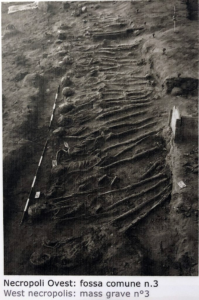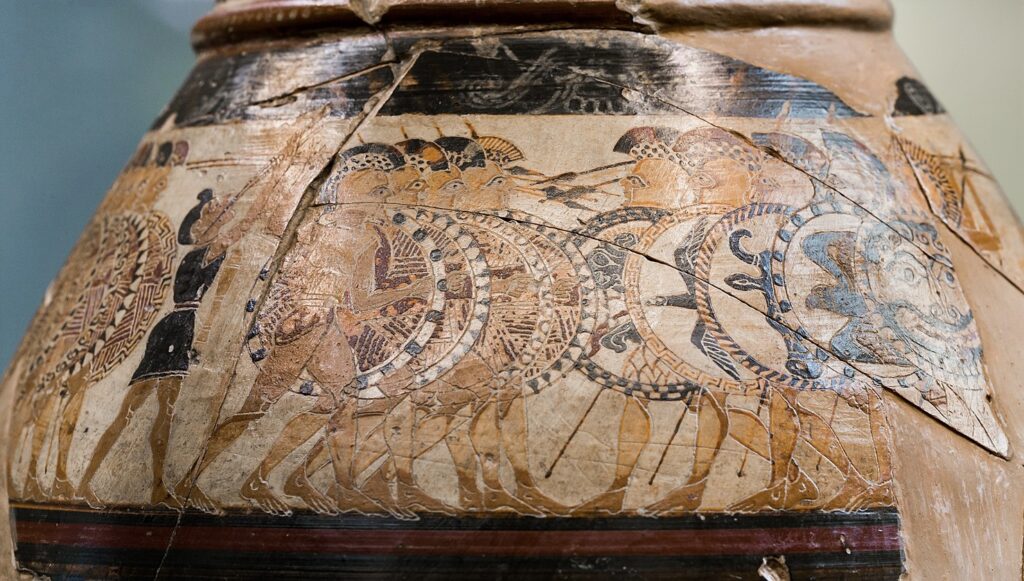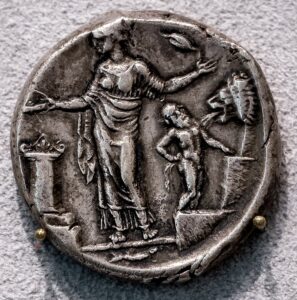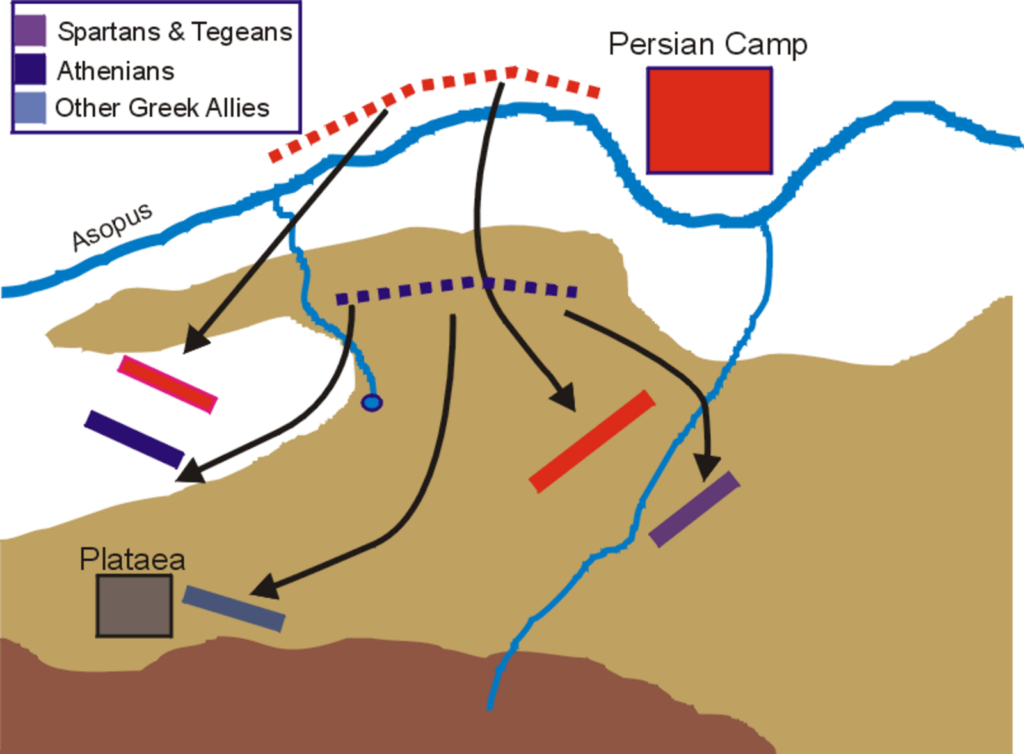
Although a terribly inaccurate rendition of what a hoplite phalanx would look like in real life, this remains an excellent rendition of what a hoplite phalanx would look like in Herodotus’ imagination.
Episode 49: In which Herodotus and Josephus debate what constitutes the essence of Greek identity, and what hoplites have to do with it.
This episode of Real Housewives of Hades (a Mt. Olympus spin-off) brought to you by the latest archaeological news on SmithsonianMagazine.com – and by CLAS-C 351 Change and Innovation in Ancient Greece.
[SETTING: Grove of Historians]
HERODOTUS, GREEK HISTORIAN AND BELIEVER IN TALKING DEER: Hey Josephus! I was mentioned in the mortal news! So exciting. All I had to do was invent the entire genre of historical writing, eventually it pays off.
JOSEPHUS, JEWISH HISTORIAN AND BELIEVER IN NOT BEING SLAUGHTERED BY ROMANS: Why were you in the news? Did they find your grave?
HERODOTUS: Oh no, I wish. They did find mass graves, however, at the site of Himera, in Sicily. Well, technically, they didn’t find the graves, they’ve known about them for decades.
JOSEPHUS: This story is getting less interesting with every sentence. It really is a wonder your brand of writing caught on.
HERODOTUS: No, wait, the mass graves are really interesting! There was a famous battle at Himera where the Cartheginians were attacking the city, and according to me, Greek citizens from near and far came to defend their fellow Greeks. And they won through their very Greekness! These mass graves are full of men aged approximately 18-50, with weapons and such, so they’re pretty clearly connected to the battle. Neat!

A discovery only an archaeologist could love.
JOSEPHUS: I’m still not following the “why this is news” part, if they’ve known about the graves for decades.
HERODOTUS: Honestly, I don’t understand either. I got so excited when I saw my name in the first paragraph, I skimmed the rest when it got confusing. Something about teeth? Here, you take a look.
JOSEPHUS: (reading scroll) So, it says that using something called “DNA,” scientists have been able to determine that a majority of the soldiers who died in the battle weren’t of Greek origin. Some of them came from as far away as Central Asia. So the mortals think the soldiers were mercenaries.
HERODOTUS: Whoa, whoa, whoa! That can’t be correct. The Greeks win their battles through their hoplite warfare! You know, where everyone lines up and each citizen soldier holds a shield to protect his fellow citizen on his left. It makes a wall of awesome and the enemy just runs away, they’re so impressed by the awesomeness.

The Chigi Vase is known for its representation of a 6th c. BCE staging of West Side Story.
JOSEPHUS: I’m pretty sure some of that isn’t correct. And why couldn’t the mercenaries fight as hoplites? You don’t have to be of any particular ethnic origin to stand in a line and hold a shield.
HERODOTUS: You’re missing the entire point! Hoplite warfare takes courage, discipline, and skill! The sort of virtue in action that is the result of Greek democracy! Or maybe the cause of Greek democracy! It’s unclear.
JOSEPHUS: Again, courage, discipline, and skill aren’t specifically Greek traits. In fact, they’re exactly the sort of thing you’d expect from professional soldiers. Like mercenaries. Also, couldn’t these men or their ancestors have moved to Himera years before and just be inhabitants of the city?
HERODOTUS: Well, they were somehow a distinct population, given that they weren’t given as fancy a burial as other soldiers. Although, that could just be the difference between citizen families and non-citizen families. We Greeks were kinda exclusive about that sort of thing. But that would imply that Himera was a major multi-ethnic city, not a bastion of Greek purity. That makes me uncomfortable.

If your coins show a woman doing the shimmy and a horny-goat-man being puked on by a lion, maybe there’s some cultural complexity going on. And/or lots of hallucinogens.
JOSEPHUS: Come to think of it, didn’t you say Himera is in Sicily? A famous cultural crossroads and mixing pot at the center of the Mediterranean? What makes you classify inhabitants of Himera as “Greek” in the first place?
HERODOTUS: Well, I presume they spoke Ancient Greek. And identified primarily as “Greek.” Not that we have any evidence for that except for public inscriptions written in Ancient Greek. But it makes me smile to presume those sort of things. The real question is, what sort of person would fight for a cause that they aren’t tied to genetically?
JOSEPHUS: I’m right here. Maybe you’d change your tune if you had seen the Romans improve your precious hoplite formation and use their version to dominate not only the Greeks and Sicilians, but the entire Mediterranean. All because they recognized the major problem of having all your soldiers stand in awkward, purposely immovable lines: enemies can just go around them. Did you Greeks seriously not realize that lines end? Y’all were supposedly master mathematicians. Come to think of it, maybe that’s why Himera won the battle: they weren’t trying to fight as hoplites.

”Am I missing something here, Maximus? Can’t we just train our soldiers to maneuver around those short purple lines? I don’t know if we’re military geniuses or they’re idiots.”
HERODOTUS: Hoplite warfare works very well, thank you very much, provided you’re fighting other hoplites or your flanks are protected by close-lying impassable terrain.
JOSEPHUS: And if that’s not the case?
HERODOTUS: Oh, then Athens burns to the ground of course. Happens all the time.
Share on Twitter, or Instagram, or really wherever you want.
To learn more about Greek influence in southern Italy (Magna Graecia if you’re nasty) and throughout the Mediterranean, enroll in CLAS-C 351 Change and Innovation in Ancient Greece, coming up Spring 2025, no pre-reqs or previous experience required! Or to explore how archaeologists reconstruct ancient identity (or at least think they do), look for CLAS-A 301 Classical Archaeology, coming next Fall 2026, also no pre-reqs or previous experience required. Can’t get enough of Ancient Greece and Rome? Earn a Classics Minor in just 15 credits!


